Tom Perez Put Corporate Lobbyists in Charge of the DNC’s Budget
Six of the ten members of the DNC Budget and Finance Committee are at-large, put forward by Chair Tom Perez, and several are lobbyists or investment heads for the fossil fuel industry.
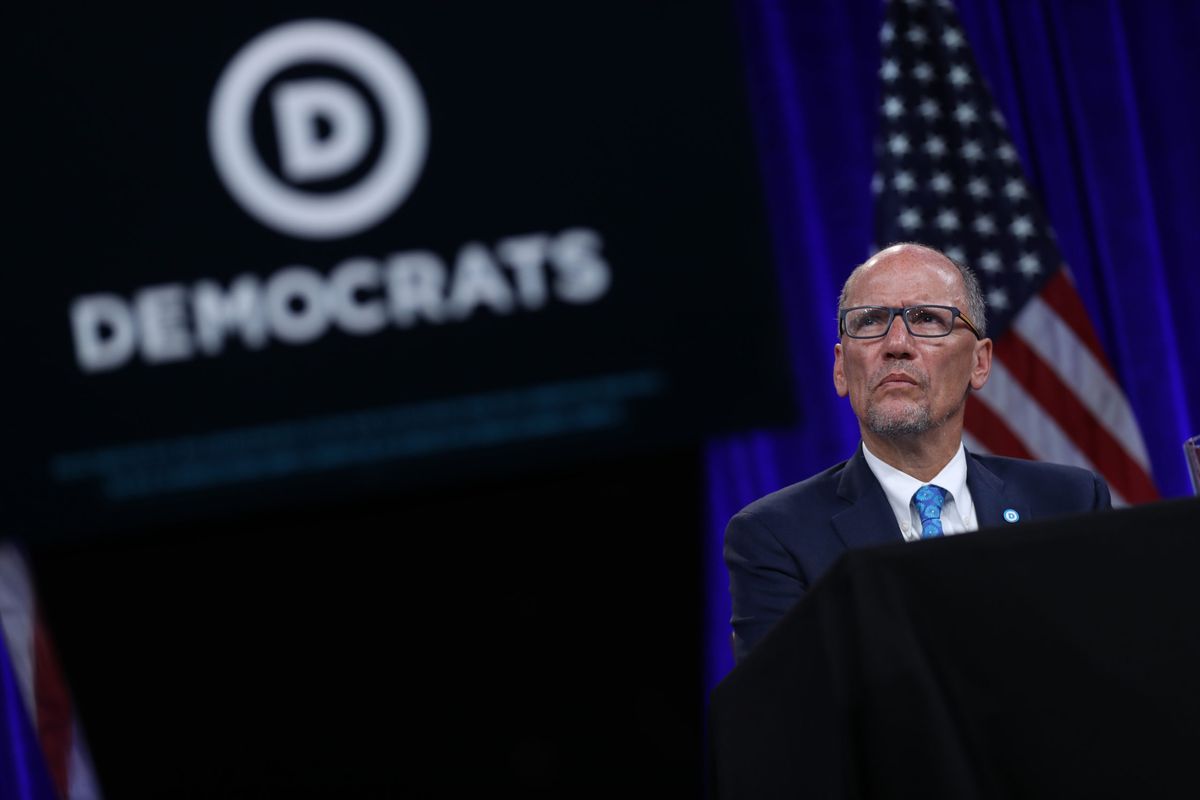
Last week, Mike Bloomberg transferred the leftover $18 million from his presidential campaign to the Democratic National Committee to use in the general election—over 23 times the maximum amount that an individual could give to a national party using all available channels.
The DNC justified Bloomberg’s donation because it came from his shuttering presidential campaign committee, a maneuver that campaign finance experts described as unprecedented in its size.
How will this windfall be spent? In short: however DNC Chair Tom Perez decides.
Headed into what is sure to be the most expensive election in history, there remains no independent oversight of the DNC chair’s expenditures or the party’s multi-million dollar contracts.
The DNC Budget and Finance Committee, whose members are appointed by Perez and the Executive Committee, is charged with approving party expenditures over $100,000, reviewing the budget on an on-going basis, and making periodic reports. The DNC bylaws call for the committee to work with the national chairperson and Executive Committee on disclosing leadership of contractors and “avoidance of conflicts of interest.”
But multiple current and past DNC members told Sludge that the committee is not fulfilling its duties. The committee is not delivering written reports to members on the effectiveness of the chair’s expenditures, according to the DNC members, and its minutes or process on avoidance of conflict of interest are not independently verifiable or publicly documented online.
Sludge reviewed a list of the ten DNC Budget and Finance Committee members as of September 2019, which the DNC does not make public, and found that several members work through lobbying and finance to advance the interests of industries that are represented by the DNC’s top vendors. The committee contains one fossil fuel industry lobbyist, a powerful former airport retail and construction lobbyist, a head investment banker at a firm behind multi-billion-dollar oil deals, and one fossil fuel industry investment officer. Six of the ten are at-large DNC members or party officers, who are put forward as a slate by the chair, and not individually elected by a state or regional delegation.
Similar to private corporations in which shareholders have a very difficult time or even are reluctant to hold board members and the CEO accountable to their own ethics rules, we have often seen the chair of the DNC get away with ethics transgressions that the party’s rank-and-file find objectionable.
Craig Holman, Public Citizen
So far this election cycle, the DNC has reported spending $112.6 million, with nearly 150 recipients at the threshold of $100,000 or above that requires approval from the Budget and Finance Committee.
The DNC’s fourth-largest outside recipient, at $3.7 million, is law firm Perkins Coie, whose major corporate clients include Amazon, Boeing, Facebook, and Google—four of the top 20 spenders on federal lobbying last year—as well as Conoco, Honeywell and Microsoft. A recent Sludge investigation found that Perkins Coie, with deep ties to Democratic Party leadership, maintains an extensive oil and gas practice, providing legal services to oil companies such as Texaco and Valero and lobbying for a coalition of small oil refineries to be exempted from renewable energy fuel standards.
Perkins Coie’s political law practice, which exclusively represents Democratic groups and politicians, has brought in over $21 million this cycle from nearly 250 campaign committees, including over $3.3 million from the Democratic Congressional Campaign Committee (DCCC) and over $2.8 million from the Democratic Senatorial Campaign Committee (DSCC).
Perkins Coie’s services were engaged last year by many of the leading Democratic presidential candidates, with payments totaling around $3.5 million from the campaigns of Elizabeth Warren, Pete Buttigieg, Kamala Harris, Cory Booker, Jay Inslee, and John Delaney, as well as the super PAC of Tom Steyer.
A Sludge review of FEC records on March 1 found that two dozen Perkins Coie employees donated over $27,000 to the Biden for President campaign, four of them at the maximum. Two dozen gave to Amy Klobuchar’s campaign, one at the maximum; over 100 donated to Elizabeth Warren’s campaign, mostly in small donations under $200. 21 employees gave close to $14,000 to Pete Buttigieg in the primary; just two Perkins Coie employees donated to Bernie Sanders’ presidential campaign, one of them in three donations of $27, for a total of $381.
On the first day of this year, the firmwide chair of Perkins Coie’s political law practice, Marc Elias, donated $20,000 to each of the DCCC and the DSCC. Last year, eight employees of Perkins Coie contributed nearly $19,000 to the DNC.
Perkins Coie’s senior media relations manager acknowledged receiving a request for comment from Sludge, but did not respond to a short list of questions about how the firm served the DNC budget committee in implementing its ethics rules or discussing recipients’ potential conflicts of interest with corporate clients.
The DNC’s tenth-largest outside recipient last year was communications agency Bully Pulpit Interactive (BPI), paid $1.5 million for digital programs and digital acquisition.
Founded by the digital marketers of Barack Obama’s 2008 presidential campaign, BPI was paid nearly $760,000 to help launch the Partnership for America’s Health Care Future (PAHCF), a dark money group formed by the pharmaceutical, hospital, and health insurance industries to stop single-payer Medicare for All. Its other clients have included energy company Exelon, Bloomberg Philanthropies, the Chan-Zuckerberg Initiative, McDonald’s, and New York Governor Andrew Cuomo.
In 2017, BPI’s client Exelon paid over $4.1 million to the Edison Electric Institute (EEI), a trade association representing the largest electricity companies nationwide including Duke Energy and Berkshire Hathaway. According to DeSmog, EEI was part of a multi-year campaign to combat net metering policies and fight against the transition to distributed solar power.
BPI client McDonald’s is a member of the National Restaurant Association, a trade group that has lobbied against wage increases in more than 30 states. While the Democratic platform states, “We believe that Americans should earn at least $15 an hour and have the right to form or join a union,” the U.S. Chamber of Commerce, which coordinated business opposition for members including McDonald’s, did not endorse the $15 wage level. Former Obama White House Press Secretary Robert Gibbs went on to become global chief communications officer for McDonald’s before just recently joining Bully Pulpit Interactive as senior counsel based in Chicago.
Bully Pulpit Interactive spokesperson Sarah McHaney told Sludge, “When we worked for PAHCF, it was an organization dedicated to building upon Obamacare. Reasonable people can disagree on the best way to provide health care for all Americans but building upon Obamacare is a path that many Democratic candidates, including our presumptive nominee, support.”
However, during BPI’s consulting period from June 2018 through December 2018, PAHCF made its launch announcement and prominently featured Mike Bloomberg’s statement that “to replace the entire private system where companies provide health care for their employees would bankrupt us for a very long time.” In January 2019, the Washington Post reported that PAHCF was formed to stop momentum towards single-payer universal healthcare.
Democratic primary voters in 20 states in a row told pollsters this year that they supported a single-payer healthcare system. In another long standing tie between DNC leadership and the health insurance industry, James Roosevelt III, an at-large DNC member on the Executive Committee and longtime co-chair of the DNC Rules and Bylaws Committee, is a policy chair of America’s Health Insurance Plans, the insurers’ trade association that was a founding member of PAHCF.
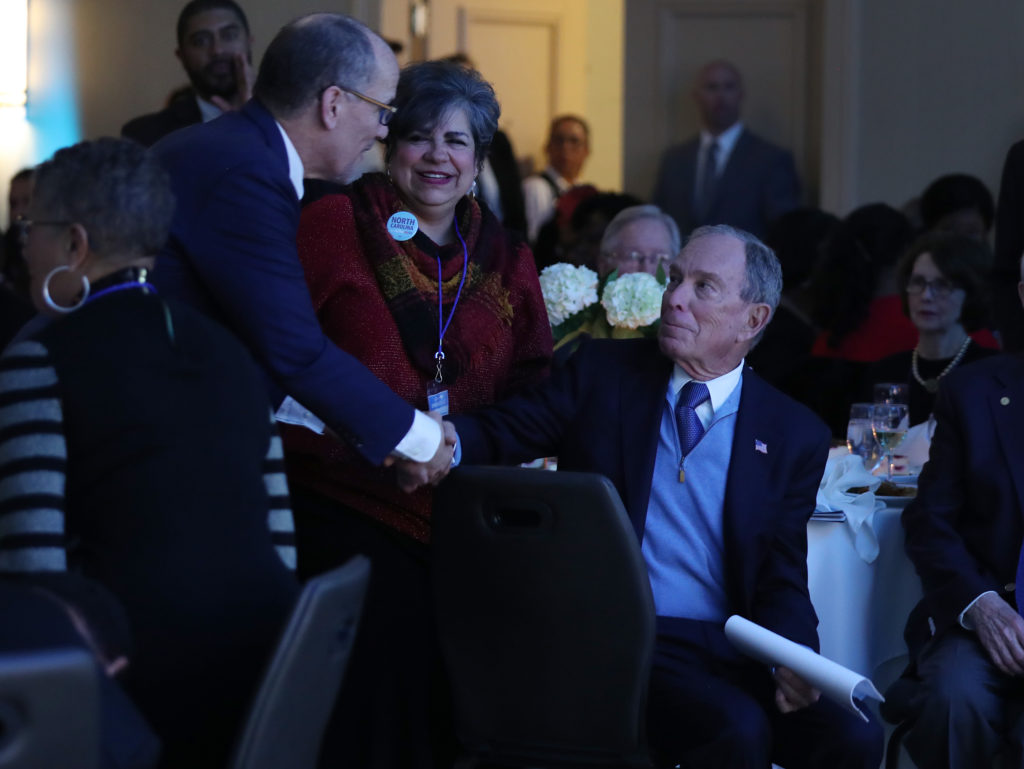
The DNC’s second-largest disbursement, after direct mail firm RWT Productions with $13.5 million, was to American Express, with $7.5 million.
In the previous election cycle, the PAC of American Express gave slightly more than half of its $521,000 in donations to Republican candidates at the federal level; in the current election cycle, that amount is up to 55% of its $263,000 in donations through March 6, according to the Center for Responsive Politics. Last year, American Express disclosed nearly $1.4 million in federal lobbying, which included lobbying on the Stop Wall Street Looting Act sponsored by Sen. Elizabeth Warren (D-Mass.) and co-sponsored by four Democrats, including Sen. Bernie Sanders (I-Vt.). The Chamber of Commerce and 47 other financial industry lobbying groups joined in opposition to the bill, which sought to fundamentally reform the private equity business.
Also in the top ten DNC vendors, alongside various payroll and financial services like ADP, Voya, and Utilpro, is voter file company NGP VAN, with $2 million to date. Digital strategy firm Blue State Digital, co-founded by Elizabeth Warren’s presidential campaign manager Joe Rospars, took in $538,995 from the national party. The Democratic National Convention Committee has reported over $2.2 million from the DNC, though with the coronavirus pandemic, whether the July convention in Milwaukee gathering 50,000 people can be safely held is doubtful.
Other noteworthy DNC expenditures include the following: $1.4 million for Amazon Web Services, another $1.2 million on Amazon, $1.2 million on Lexis Nexis, over $900,000 on Facebook, $569,000 on investment firm Willis of New York, and $7,742 with consulting firm Precision Strategies, co-founded by Joe Biden’s new campaign manager Jen O’Malley Dillon. DNC Chair Tom Perez was paid $149,008.
Who Approves The Party’s Budget
Members of the DNC Budget and Finance Committee are appointed by the DNC Executive Committee, which Sludge previously found itself contains at least 17 members with principal positions or past positions representing corporate interests.
The Budget and Finance Committee contains prominent New York and New Jersey lobbyist Tonio Burgos, a DNC member from New Jersey whose major clients include fossil fuel energy powerhouse Williams Companies, as well as Pfizer, EmblemHealth, and Verizon. Burgos, whose firm received over $1 million lobbying for Williams’ fracked-gas pipeline, also serves on the Executive Committee and is a longtime associate of New York Governor Andrew Cuomo, whose re-election in 2018 was endorsed by Tom Perez.
Editor’s note: this DNC member investigative series took hundreds of hours of research to produce. For current DNC committees, this is the first time this information has been reported.
Please support Sludge’s independent journalism by subscribing today, helping us follow the money throughout the 2020 election year.
Also on the committee is DNC Treasurer Bill Derrough, co-head of investment banking firm Moelis & Co., whose clients include foreign banks, agribusiness, fin-tech companies, and federal defense contractors. Moelis’ top clients in advisory services around mergers & acquisitions and restructuring have included Pfizer (deals totaling $160 billion in value), Brazilian petroleum company Petrobras (deals totaling $127 billion), Disney, Dell, Anheuser-Busch, private equity firm Apollo Global Management, the Government of Dubai, and oil company Saudi Aramco (deals totaling nearly $30 billion).
Newer to the committee is Chris Korge, partner at Florida corporate law firm Korge & Korge, whose advertised specialities include government contracts and procurement and legislative affairs. A top fundraiser for Hillary Clinton’s presidential campaign and 2018 Florida gubernatorial candidate Andrew Gillum, Korge was named national DNC finance chairperson in May 2019. A Miami area fundraiser and political kingmaker known as “the king of the airport lobbyists,” Korge was paid $1.3 million in lobbying fees by a publicly-funded consortium of private engineering firms. Korge appears to be an at-large DNC member, appointed to the Budget and Finance Committee by Perez and not individually elected by the Florida delegation or national DNC members.
Committee member Christopher Lowe, an at-large DNC member and deputy national finance chair, is the chief investment officer at SteelRiver Infrastructure Partners. The bicoastal firm formerly invested in fossil fuels companies, including utilities Delta Natural Gas, People Natural Gas, and oil and gas pipeline firm SICIM. Its former assets also included San Francisco Bay Area electrical utility cables and freight transportation such as national railroad lines and southeastern U.S. seaports. In 2017, SteelRiver spent $85,000 lobbying on tax issues with Farragut Partners LLP, a firm with a long list of corporate clients.
One of the committee’s co-chairs is Daniel Halpern, an at-large DNC member and a member of the Executive Committee, who is CEO and co-founder of food and beverage company Jackmont Hospitalities. The other co-chair is Doris Crouse-Mays, DNC member from Virginia and Executive Committee member. President of the VA AFL-CIO since 2010, she has been an AFL-CIO lobbyist in the state since 2015, and according to the Virginia Public Access Project, going back to 2006. She is a member of the Steering Committee of the Virginia Democratic Party.
The remaining four members of the Budget and Finance Committee are as follows: Joe Barbuto, the chair of the Wyoming Democrats; Morgan Carroll, the chair of the Colorado Democrats; Juanita G. Luiz of Washington, former representative of the International Brotherhood of Electrical Workers’ political and legislative department, who appears to be an at-large DNC member; and Alexis Wiley, an at-large DNC member and chief of staff to the mayor of Detroit.
Official Name: DNC Services Corporation
The Democratic National Committee operates as a private corporation, not as a non-profit organization or a publicly-owned company, and it has no legal obligation to follow its own rules on impartiality or fiduciary responsibility to its donors.
DNC Member and reform advocate James Zogby told Sludge of the party’s financial oversight, “I’ve never seen it more opaque. Around two-thirds of the standing committees are at-large members, appointed by the chair. The bylaws say we’re supposed to review the effectiveness of expenditures.”
Government ethics expert Craig Holman of Public Citizen told Sludge that the DNC has a history of flouting ethics norms, even the kind that are typically enforced by private corporations.
“Staffed by the leadership of the state and national Democratic parties, the DNC has often pursued its own path toward promoting a favored presidential candidate, even to the point of eschewing widely accepted ethics norms,” Holman said. “Sometimes the DNC has even sought to undermine the ethical norms of its own presidential candidate, as happened when the DNC undercut Obama’s pledge not to accept money from registered lobbyists. Other times the DNC simply rejects ethics standards that it perceives as constraining the work of the committee, such as rejecting an adequate conflict of interest rule.”
“Similar to private corporations in which shareholders have a very difficult time or even are reluctant to hold board members and the CEO accountable to their own ethics rules, we have often seen the Chair of the DNC get away with ethics transgressions that the party’s rank-and-file find objectionable,” Holman added. “The solution is difficult and tedious in which the rank-and-file must make their objections clearly known to the Chair and the DNC, either through public humiliation or through electing new party leaders, or both.”
“The progressive wing of the Democratic party has these limited options for reform available. But significant change will not come without a fight,” Holman said.
If the DNC were to adopt a strong ethics policy—one that barred financial contracts with voting members’ employers—it would force DNC members like Jennifer Cunningham of New York, an influential political strategist with Democratic party consultant SKDKnickerbocker, to give up their DNC positions and superdelegate votes. SKDKnickerbocker has previously consulted for the DNC and DSCC, as well taking in $40,000 last year from the DCCC. The firm’s managing director, Anita Dunn, has been a senior adviser to Joe Biden’s presidential campaign since last year and in January was promoted to have more authority, though SKDKnickerbocker’s corporate clients worked in the past to undermine Democratic initiatives.
Six DNC officials, including Communications Director Xochitl Hinojosa, a former top Perez adviser at the Labor Department, as well as the Budget and Finance Committee co-chairs, have not responded to multiple requests for comment over the past several months.
Update, Oct. 8, 2021: SteelRiver Infrastructure Partners, where Christopher Lowe is a partner, sold its investments in natural gas utilities to Essential Utilities in March, 2020.

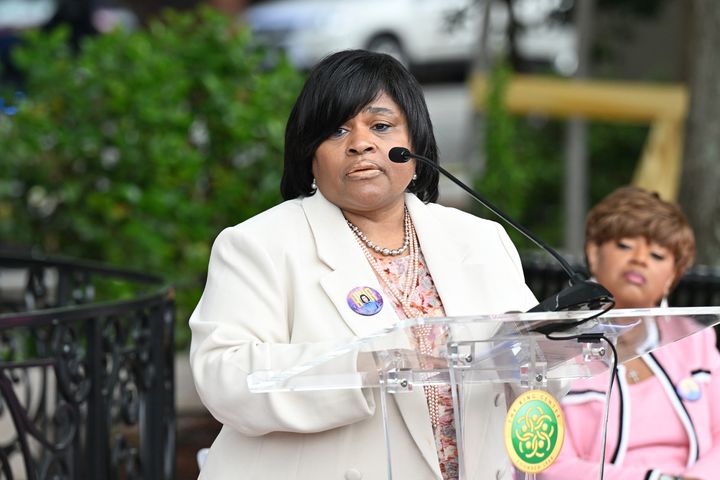
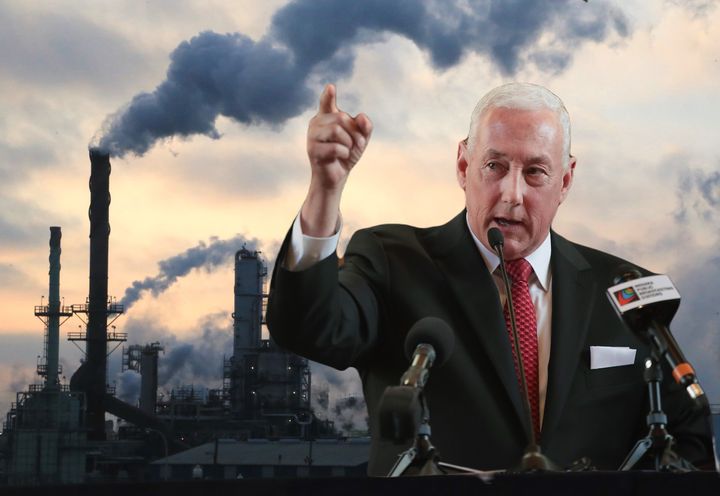
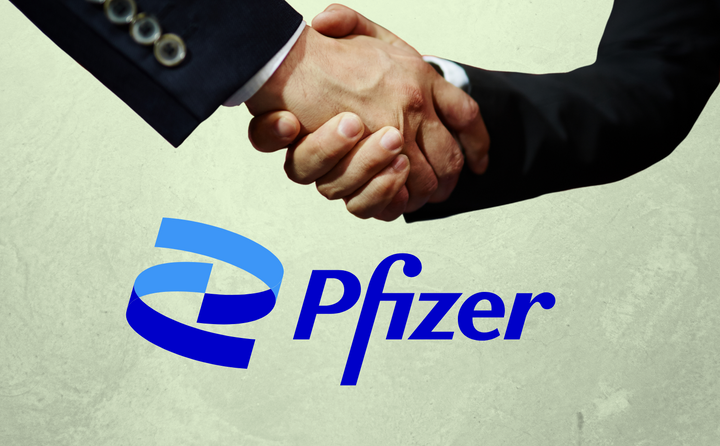
Comments ()